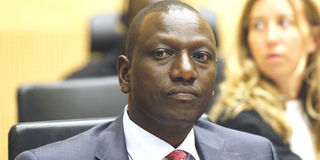ICC judges hear Kenya victims’ pain

Eldoret North MP William Samoei Ruto following proceedings in the courtroom of the International Criminal Court (ICC) in The Hague, The Netherlands, on September 1, 2011. Mr Ruto, former industrialisation minister Henry Kosgey and radio presenter Joshua arap Sang are facing charges of crimes against humanity at the ICC. Photo/AFP
It was a hushed court as judges at the International Criminal Court (ICC) were told of the pain and tribulations of 327 victims of the Kenya election chaos.
The legal representative of the victims, Sureta Chana, took the floor soon after the prosecution concluded its opening statement and said:
“It is not possible to introduce all 327, but they were people who lost loved ones, had their lives turned down and mostly from the Rift Valley.
“Virtually everyone of the them had their homes destroyed and had to flee, some are yet to return to what they called home,” Ms Chana told the judges.
According to her, the victims who returned to their homes have had to live with direct perpetrators.
Ms Sureta said that victims felt the government had no time for the "little man" but was out to shield the powerful.
Confirmation
The ICC pre-trial chamber on Thursday begun hearings that will decide whether to confirm charges that have been brought against six prominent Kenyans for their role in the violence. The chaos, triggered by a disputed presidential election, left 1,300 dead and more than 600,000 homeless.
ICC chief prosecutor Luis Moreno Ocampo has identified the six as the most culpable. They include William Ruto, Member of Parliament (MP) for Eldoret North and until recently a Cabinet minister in the coalition government set up as part of the peace deal to quell the chaos.
Others are Henry Ruto, MP for Tinderet and a suspended Minister for Industrialisation, and radio presenter Joshua Sang. The three are accused in the first case where they are alleged to have committed the crimes against humanity in an effort to push the Orange Democratic Movement (ODM) party into power.
Confirmation hearings for the second case will begin on September 21. It is against Cabinet secretary Francis Muthaura, former police chief Hussein Ali, and Deputy Prime Minister and Minister for Finance Uhuru Kenyatta. Mr Kenyatta, a son of Kenya’s first president Jomo, is also the MP for Gatundu. Mr Muthaura, Mr Ali and Mr Kenyatta are accused of having committed the offenses in an effort to keep the Party of National Unity (PNU) in power.
ODM's Raila Odinga and PNU's Mwai Kibaki were the two top contenders in the presidential election. The incumbent, Mr Kibaki, had just been declared the winner and had just been sworn in for a second term when the chaos erupted. A deal brokered by former UN secretary general later brought ODM into government in a coalition which saw Mr Odinga take up the position of Prime Minister.
Cries for help
Ms Chana told the court how some victims responded to what they thought were cries for help only to realise later that these were well orchestrated plans to draw them out for attacks.
"I took to my heels, but the youth hunted me down, shot me with an arrow stoned me leaving me for death. I am now paralysed," Ms Chana quoted one victim.
Another victim sought refuge at a church. But youths sealed all entrances and set the placed of worship on fire.
“She threw her child from the inferno in a bid to save its life to no avail.”
The victims had the indignity of being unable to feed one's family was hurting, endured little help from government, living in deplorable conditions, she said.




